 |
Unknown or Missing plugs and sockets |
| This page shows plugs and socket for which
help by others is appreciated ! Help refers to: 1. Material in the collection that is unknown to me and useful information has not been found on internet or elsewhere. 2. Material that must exist, but is very difficult to find. For example, the museum has a plug, but the matching socket is missing. Your help to find a missing item or
unknown information is greatly appreciated !
>>> Click Home for the address to contact me <<< |
| Unkown
plugs or sockets |
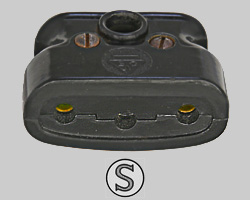 |
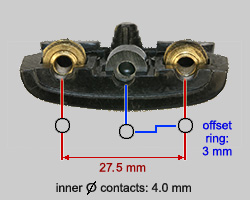
|
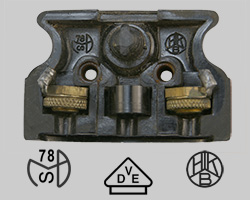
|
| Bakelite contact
plug with an unusual large - 27.5 mm - spacing of slots for 4.0 mm
pins. Halfway in between the pin slots is a plastic ring. This "dummy"
slot has a 3 mm offset. It seems likely that the plug has been designed for an, unknown, appliance with two power pins and "dummy" pin to assure a single plug orientations. However, left and right contact do not have AC L/N or DC plus/minus marks. Volt and amperage rating are not indicated. |
{MN} |
Logo and marks: • Circle with large S. May be related to manufacturer. Several companies use(d) a similar logo, but a logo with an identical typeface S has not been found. • MPAD mark: 78 = Hugo Krieger & Faudt Elektrotechnische Fabrik in Berlin (could apply to the cast only). S = Bakelite reinforced with sawdust. • VDE: German certification mark. • HKB: probably an older type Hugo Krieger Berlin logo. |
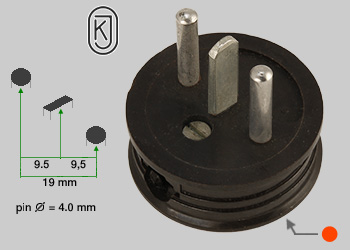 |
Bakelite 3-pin plug made by an unknown
manufacturer, using KJ logo. Essentially a non-polarized plug, but top of the plug has a red dot above one of the round pins. Line, Neutral and Earth are not indicated. Plug has a side cord entry. It is unknown for which purpose the plug has been designed; a specific application or ...? If you recognize the plug, please contact the museum. Information about the KJ logo is appreciated also. {BNS}
|
| No longer unknown |
Thanks to the help of museum visitors ! |
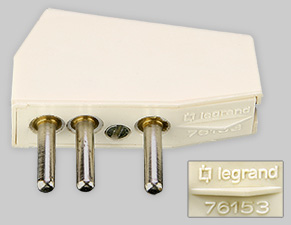 |
3-pin plug made by the French company Legrand. Identified by Michel Lagravere as extra low voltage plug. Attached cord with button coiuld be used to operate relais. Find more details at page with uncommon French plugs. |
 |
 |
The heat element has been found, as separate item, in a farm in Saxony, Germany by Peter W. Martin. Thanks to Reimar Lüngen details about the use of the heat element has been clarified. See Depot image no. 10 for details. |
 |
|
The intially unknown outlet that may accommodate 12 Europlugs is a: Rozetkus-1 power strip, designed by Art. Lebedev Studio in Moscow. Find information and other design outlets on artlebedev website. Origin of the outlet has been found thanks to research by Reimar Lüngen. |
| No longer missing |
 |
For decades Greece had a, nowadays
rare, type of earthed sockets and plugs, known as tripoliki mpreza (sockets) and tripoliki visma (plugs). In 1989 Greece switched to CEE 7/3-7/4 (Schuko) standard for earthed plugs and sockets. A Tripoliki mpriza was for many years missing in the collection, but thanks to successful investigations by Michail Kritsotakis the museum has now two old type Greek sockets. See Greek page. for more images and information |
|
|
|
|
|
|